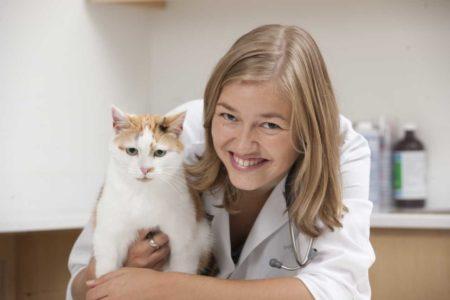
Credit: University of Guelph
Got a cat that always seems hungry? New University of Guelph research suggests you might want to reduce — not increase — how often you feed them.
Animal nutrition specialists in U of G’s Ontario Veterinary College (OVC) and Ontario Agricultural College (OAC) have found that feeding cats one large meal a day may help control hunger better than feeding them several times a day.
The research, published in the journal PLOS One, revealed that cats that ate one meal a day were more satisfied, which could result in less food-begging behaviour.
The results also suggest cutting back feeding frequency could help reduce the risk of obesity by controlling cats’ appetite and potentially making them eat less – an important discovery given that obesity is the most common?nutritional problem?affecting?cats.
“These findings may surprise the veterinary community and many cat owners who have been told their animals need several small meals a day,” said study co-author Prof. Adronie Verbrugghe, a veterinarian with OVC’s Department of Clinical Studies, who specializes in companion animal nutrition. “But these results suggest there are benefits to this approach.”
Previous research has examined the effects of meal frequency on cat behaviour, but this study is the first to use a comprehensive approach analyzing effects on appetite-suppressing hormones, physical activity, energy expenditure and use of energy sources, said co-author Prof. Kate Shoveller, an expert in animal nutrition with U of G’s Department of Animal Biosciences.
“There was no good research to back up the several-meals-a-day approach that many owners hear, and so we wanted to put some real data behind current feeding recommendations to be sure they were right for cats,” she said.
The study involved eight?healthy-weight, indoor cats under the age of five.? Each cat was exposed to both feeding regimens and each for a total of three weeks, with the same diet and amount being offered in either one meal or four meals. Some of the cats were fed only in the morning, while the others were fed the same amount in four smaller meals.
The cats were equipped with activity?monitors on harnesses?to measure their voluntary physical activity. Food intake?was recorded?daily,?and body weight was?measured?weekly. Researchers also measured cat metabolism through breath and blood.
Physical activity was higher in cats fed four times a day, but overall energy expenditure?was?similar between the groups. The weights of the cats in both groups did not change over the study period, no matter which feeding schedule they were on.
Cats that ate just once a day had higher post-meal levels of three key appetite-regulating hormones, suggesting they were more satisfied. These cats also showed lower fasting respiratory quotient, suggesting they were burning their fat stores, which is key to maintaining lean body mass.
The cats that ate only one meal a day also had a larger increase in blood amino acids, meaning more protein was available to them to build muscle and other important proteins. This is important given that many cats lose muscle mass as they age, a condition known as sarcopenia.
“Physiologically, it makes sense that feeding only once a day would have benefits,” said Shoveller. “When you look at human research, there’s pretty consistent evidence that there are positive health outcomes with intermittent fasting and improved satiety.”
Even big cats in the wild engage in a form of intermittent fasting, the authors note, feasting when they make a kill and fasting before the next one.
While their data suggest feeding once a day may be a good way to promote satiation and lean body mass, the researchers would like to do longer studies.
“This approach is really yet another tool in a veterinarian or a cat owner’s toolbox for managing a cat’s weight and keeping their animals healthy and happy,” said Verbrugghe. “But we always have to look at each individual animal and account for the cat’s and owner’s lifestyle. So although this approach might be helpful to promote satiety in some cats, it might not help another.”
###
The research was funded with support from the Winn Feline Foundation and Simmons Pet Food.
Media Contact
Prof. Kate Shoveller
[email protected]
Original Source
https:/
Related Journal Article
http://dx.




